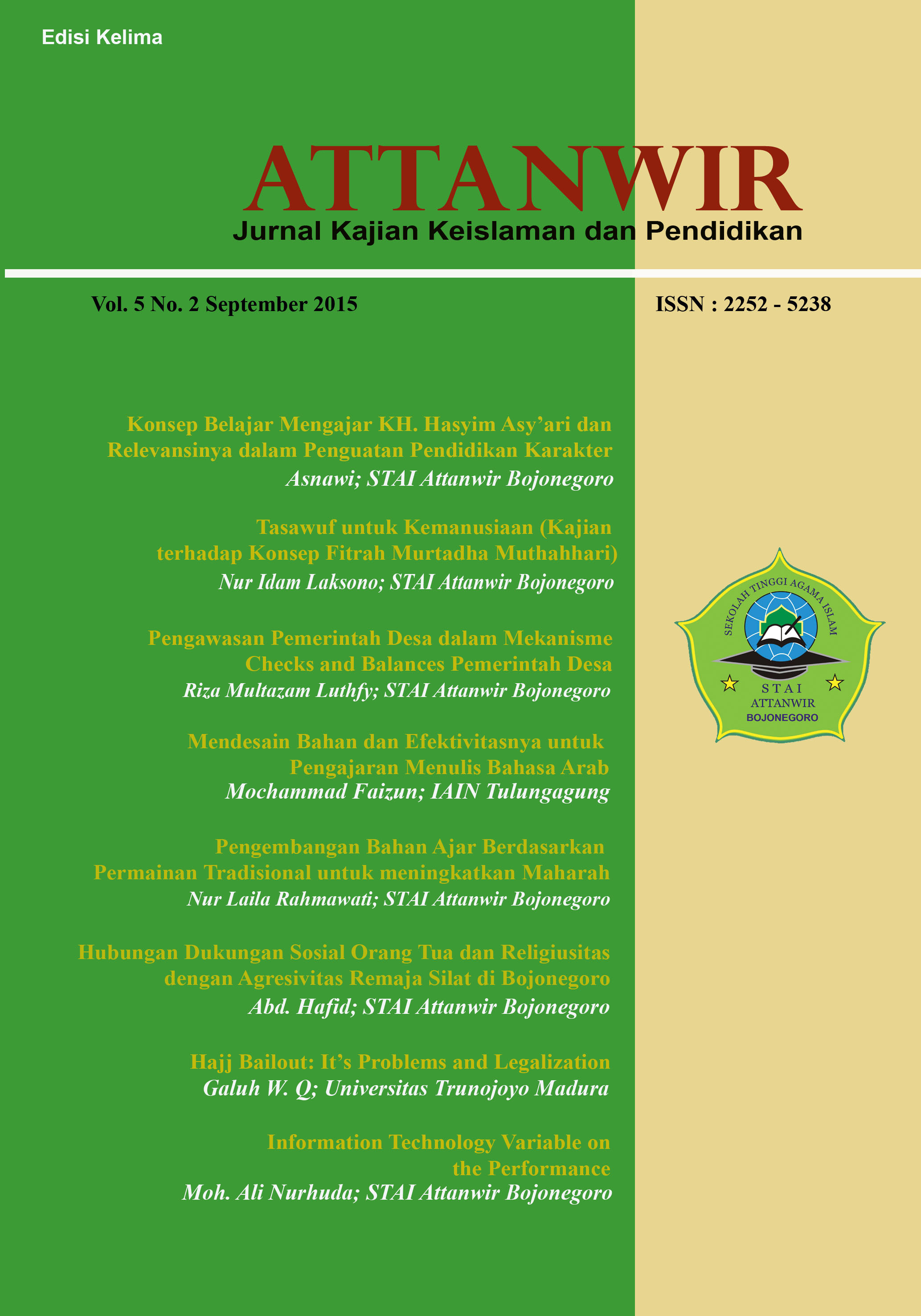HUBUNGAN ANTARA DUKUNGAN SOSIAL ORANG TUA DAN RELIGIUSITAS DENGAN AGRESIVITAS REMAJA ANGGOTA PERGURUAN PENCAK SILAT DI BOJONEGORO
Abstract
This study was conducted to determine the relationship between parental social support and religiosity with adolescent aggressiveness member martial arts college in Bojonegoro. Subjects were 95 adolescents residing in District Sumberrejo Bojonegoro. The instrument used is the scale of parental social support, religiosity scale, and the scale of aggressiveness. Parental social support scale consisted of 39 item with α = 0.881, religiosity scale consists of 40 item with α = 0.930, and the aggressiveness scale consists of 54 item with α = 0.966. The results showed that between social support and religiosity parents together no significant association with aggressive, as indicated by the price of F = 1.041 and p = 0.357 (p> 0.005). Results of partial correlation analysis showed that there was no relationship between social support parents with behavioral aggressiveness, as indicated by the value rx1y = 0.114 and p = 0.270 (p> 0.005). There is no relationship between religiosity and aggressiveness, with rx1y value = 0.130 and p = 0.208 (p> 0.005). From the results of the regression analysis showed that there was no relationship between parental social support and religiosity with adolescent aggressiveness member Bojonegoro martial arts college in 2014.
References
Quest and Prejudice. The International Journal for the Psychology of Religion, 2,113- 133.
Azwar, S. 1999. Penyusunan Skala Psikologi. Yogyakarta: Pustaka Pelajar.
Azwar, S. 2000. Reliabilitas dan Validitas. Yogyakarta: Pustaka Pelajar.
Bandura, A. 1977. Self- Efficacy: Toward a Unifying Theory of Behavioral Change. Psychological Review, 84,191- 215.
Bandura, A. 1982. Microanalisys of Action and Fear Arousal as a Function of
Differential Levels of Perceived Self- Efficacy. Journal of Personality and
Social Psychology, 43, 5- 21.
Bandura, A. 1986. Social Foundation of Thought and Action, A Social Cognitive
Theory. Englewood Cliffs, New Jersey: Prentice- Hall, Inc.
Bandura, A. 1997. Self -Efficacy, The Exercise of control. New York: W.H. Freeman and Company
Bandura, A. & Schunk, D.H. 1981. Cultivating Competence, Sel f - Efficacy, and
Intrinsic Interest Through Proximal Self - Motivation. Journal of Personality and Social Psychology. 41,586- 598.
Bernard, H.W. & Huckins, W.C. 1978. Dynamic of Personal Adjustment. Sydney: Holbrook Press. Allyn and Bacon, Inc.
Chauhan, S. S.1978. Advanced Educational Pshychology. New Delhi: Publishing
House PUT. LTd.
Cole, L. 1963. Psychology Of Adolesence.Fifth edition. New York: Holt Rinehart and Winston.
Daradjat, Z. 1996. Ilmu Jiwa Agama. Jakarta: Penerbit Bulan Bintang.
Daradjat, Z. 1997. Pendidikan Agama dalam Pembinaan Mental. Jakarta: Bulan
Bintang.
Diener, E. 2000. Subjective Well- being:The Science of Happiness and a Proposal for a National Index. American Psychologist, 55, 34- 43.
Driyakara, N. 1982. Pengantar Psikologi Agama. Jakarta: Lappenas.
Azwar. S. 2003. Metode Penelitian. Yogyakarta: Pustaka belajar.
_______. 2004. Reliabilitas dan Validitas. Yogyakarta: Pustaka belajar.
_______. 2007. Penyusunan Skala Psikologi. Yogyakarta: Pustaka belajar.
Ahkam M. 2012. Hubungan Antara Efikasi- Diri dan Religiusitas dengan Kemampuan Penyesuaian Diri Mahasiswa. Tesis (tidak diterbitkan). Yogyakarta. Fakultas Psikologi Universitas Gajah Mada.
Suryabrata S. 2010. Metodologi Penelitian. Jakarta: Rajawali Pers
Yusuf S. 2011. Psikologi Perkembangan Anak & Remaja. Cetakan keduabelas. Bandung : PT. Remaja Rosdakarya
Copyright (c) 2019 Attanwir: Jurnal Kajian Keislaman dan Pendidikan

This work is licensed under a Creative Commons Attribution 4.0 International License.



